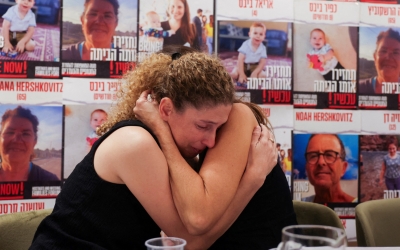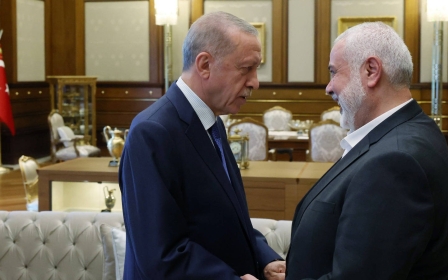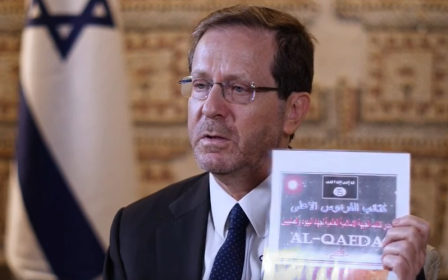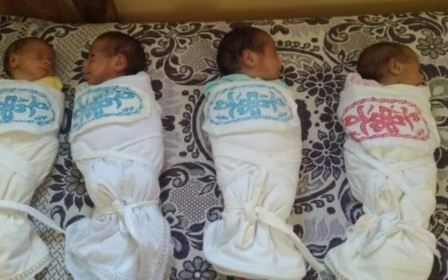Israel-Palestine war: Herzog gives captives' families comfort but little news
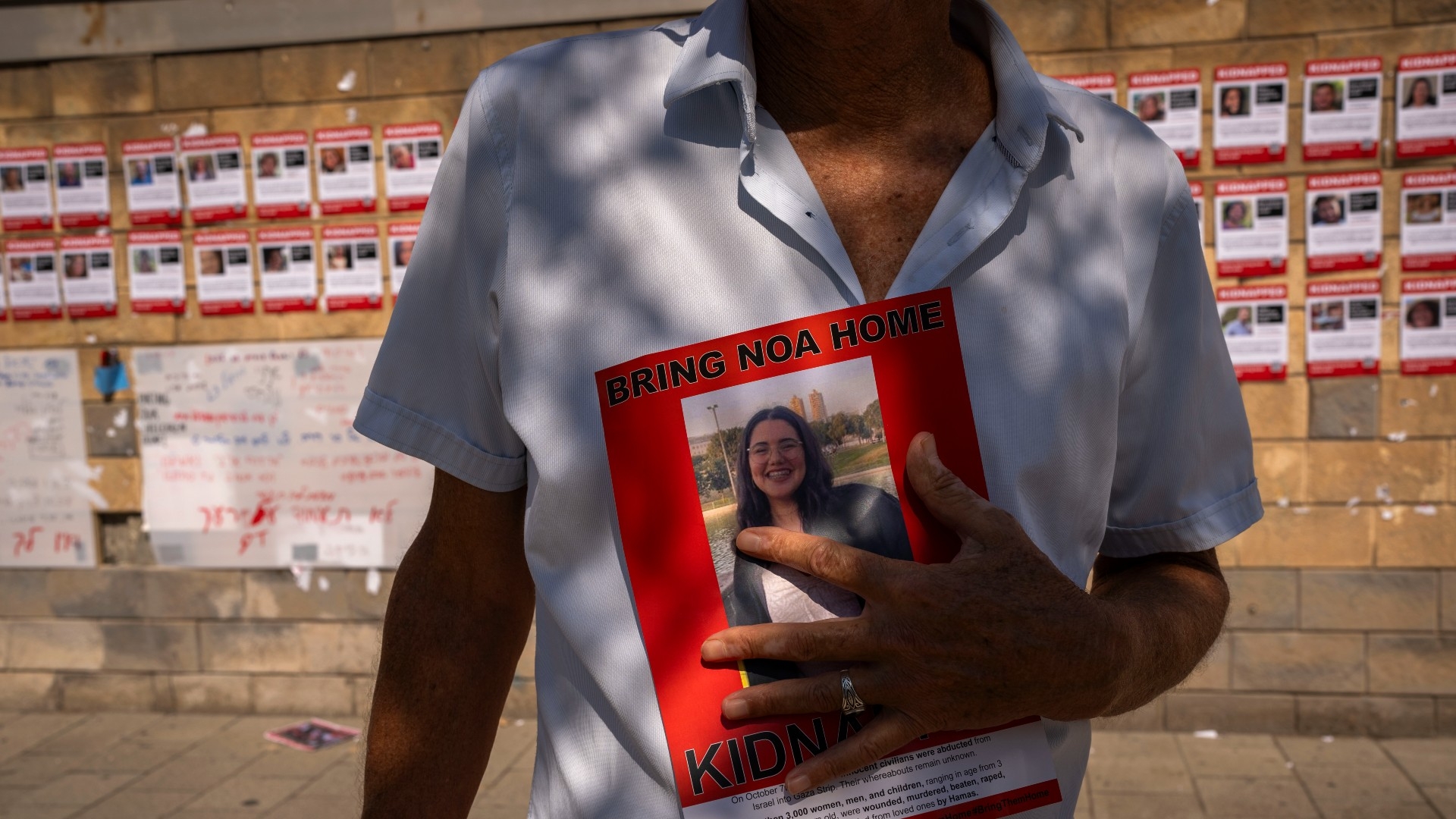
Two days after two US-Israeli women were released by Hamas, Israeli President Isaac Herzog invited representatives of the captives’ families to the presidential residency in Jerusalem.
Israel says Hamas took 222 people captive when it attacked communities near the Gaza Strip on 7 October, though that number may be higher, as the fate of several others is not yet known.
Though ostensibly the release of the women is a cause for celebration, the fact that the first of their number to be freed were citizens of a foreign country has caused mixed feelings among the Israeli public. There’s a fear that dual citizens are being prioritised while Israelis are being left to their fate.
Meanwhile, the arrival of humanitarian aid to Gaza after their release also caused disquiet, with some believing Israel had lost some leverage in allowing the aid’s passage and that it was a concession to US President Joe Biden.
Despite these feelings and many relatives’ dismay, the families’ representatives refused to raise the issue of dual nationals in their meeting with Herzog.
New MEE newsletter: Jerusalem Dispatch
Sign up to get the latest insights and analysis on Israel-Palestine, alongside Turkey Unpacked and other MEE newsletters
“We’ve come to hear. Just to hear, and hopefully it will be made clear to us that no one forgets our families who were kidnapped to Gaza,” the father of one captive, who arrived early, told Middle East Eye.
Among the representatives was Michal, the relative of three-year-old Abigail, who came holding her picture.
“Both of her parents and her two brothers were murdered. The neighbours noticed her, took her and then they too were kidnapped. I want the whole world to know that a three-year-old girl, who no longer has a father, mother and brothers, is there in Gaza and we don't know how she is doing,” Michal said.
“We feel like no one is listening to us. We want to raise public awareness everywhere; we want the world to at least listen to us.”
Supportive crowd
The meeting was scheduled for 6.30am and continued until 9am, while hundreds of Israelis, most of them residents of Jerusalem, stood on the pavement in front of the president's residence.
They held signs calling for the release of the abductees and Israeli flags, while Israeli and foreign media stood on the opposite side of the street.
As evening fell, the crowd began to sing softly and continuously - mainly familiar old songs from Israel’s early years, songs associated with the kibbutz movement, as well as those based on excerpts from Jewish sources.
Yellow ribbons, an international symbol for those awaiting the return of captives, were hung on trees and distributed to the crowd.
Follow Middle East Eye's live coverage for the latest on the Israel-Palestine war
Hamas says its captives are being held across the Gaza Strip, which has been bombed relentlessly by Israel since the Palestinian attack that killed 1,400 Israelis.
More than 5,000 Palestinians have been killed in two weeks. Hamas has claimed some of its captives have been killed by Israeli strikes, without offering proof. It also accused Israel of refusing to receive two more captives on Saturday, which the Israelis denied.
Outside the presidential residency, Orian Hader told MEE about her 85-year-old grandmother Alma, who is among the captives.
“We sent the list of medicines she needed through the Red Cross, but unfortunately we did not receive any response, absolutely nothing. She is an old woman, she needs her medication, she cannot survive without them,” she said.
“I want them all back home before they all die. I want to hold my grandmother again and not bury her corpse. I'm here to make sure they get everyone back. There are old people there like my grandmother, there are babies, there are children... they must be brought home.”
'The only hope for us'
When the representatives emerged from their meeting, deep into the Israeli media’s evening news broadcasts, onlookers began to sing the national anthem.
Most of the families preferred not to stop in front of the television cameras and quickly escaped to their cars. But some agreed to say a few words.
One, the father of a young female soldier called Roni, spoke on behalf of the other families.
“This is the second meeting with the president. Tonight, we leave a little more encouraged, we hope that the situation will change. What we had tonight at the president's house was an inclusive meeting: the president listened to us and we left the meeting feeling a little bit better, with the understanding that our pain is being listened to,” he told journalists.
"The meeting was attended by President Herzog, his wife Michal, as well as Yossi Cohen, the former head of the Mossad. We did not receive any answers regarding the condition of our loved ones, but we felt that we were being listened to. It was an attentive meeting.”
No one was able to explain the presence of Cohen, long considered a close ally of Prime Minister Benjamin Netanyahu. However, Roni’s father was informed that his daughter was one of seven abducted female soldiers and seven more missing from the military base at the Nahal Oz kibbutz.
A nine-month-old baby, its four-year-old brother and Abigail are also among the captives, they were told.
Roni’s father said, tearfully, that they had been promised that everything would be done to bring everyone home.
“This is the only hope for us, the parents and family members. It is a difficult and cruel event. We are still not talking about a deal or any plans for what will happen in the future. We don’t know if there are any such plans. Mostly they listened to us,” he said.
“I am currently addressing one person: the prime minister. I’m asking you personally: you recruited our girls, you sent them on a mission, so the demand is for you to bring back all the missing female soldiers.”
Middle East Eye delivers independent and unrivalled coverage and analysis of the Middle East, North Africa and beyond. To learn more about republishing this content and the associated fees, please fill out this form. More about MEE can be found here.


